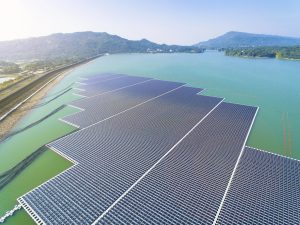Taiwan’s transition from coal and gas to renewable energy, mostly solar and wind, is crucial for the country to reach its legally enshrined 2050 target for net-zero emissions. And it’s not just about emissions reduction; this next evolution of the electricity system is the foundation for Taiwan’s ongoing economic development. But while Taiwan could be demonstrating its character as a world innovator – decarbonizing the world microchip supply chain and establishing cheaper, secure and independent electricity systems for its citizens – progress is slow.
Weak government communication, a lack of transparency, and unfocused energy policy have created a vacuum that vested interests and opportunistic political and media actors are filling with baseless speculation, conspiracy, and misinformation – especially about solar power.
Globally, much research and documentation has shown how the coal, oil, and gas industries have intentionally misled the public for decades about the negative impacts of fossil fuels. They have also run a campaign to create distrust and confusion about renewable energy, to prolong their profits and fight off competition from solar and wind that offer cheaper, healthier, and more resilient energy. In Taiwan, it is not so much these industrial players stoking the public discourse, but rather opportunistic politicians and media influencers jumping on this well-funded global campaign of anti-renewables conspiracy and disinformation. The root of the problem lies with the government.
There are various types of solar projects, each crucial for transitioning Taiwan’s power generation. While roof PV systems – solar panels on buildings and households – are widely accepted, the government faces significant challenges in securing support for ground-mounted PV systems and mixed land-use projects like “Fishery and Electricity Symbiosis” (漁電共生) and “Agro-Photovoltaics” (農電共生). These projects are vital for supporting industry but have been delayed, partly due to the limited availability of land for solar installations.
The complex issue of negotiating land use was highlighted by the Energy Administration in their 2024 white paper, which identified Taiwan’s land use laws, such as the Regional Planning Law, as lacking clear guidelines for managing photovoltaic development. Poor communication, policy inconsistency, and a lack of transparency with landowners and farmers have further allowed false claims to spread, fueling disinformation. Additionally, a few solar projects and photovoltaic industrial actors have been legitimately linked to fraud, government-industry collusion, landscape damage, and harm to landowners and farmers.
The scarcity of available land means it is absolutely essential to fix these laws, enforce a high professional and safety standard in the industry, and communicate and provide transparent information to local communities. Otherwise, Taiwan’s people have no reason to trust and support these important innovations.
Claims about perceived harms from solar energy have arisen from public confusion and concerns about energy policies, and solar opponents have weaponized these claims, turning them into disinformation and amplifying them through the media. Instances of fraud within the photovoltaic industry have been cherry-picked and exaggerated by the opposition party and its media to attack the government, eroding public trust in solar energy.
Taiwan’s highly polarized political landscape, dominated by the Kuomintang (KMT) and Democratic Progressive Party (DPP), has turned energy transition policy into a partisan battleground. Ideological divisions and the framing of energy issues as matters of national, regional, and global security have deeply politicized the energy transition, exacerbating social fragmentation.
News reports and biased political commentary shows have picked up these themes and been key amplifiers of disinformation on energy transition. Politicians, commentators, media outlets, and influential personalities appear coordinated in spreading these false narratives. Political followers, pro-Chinese Communist Party actors, and inauthentic accounts further fuel this effort, sowing division online. Disinformation starts from isolated incidents online, but then gets picked up by major media outlets, discussed by political commentators, and amplified by key opinion leaders. These narratives are widely shared across Facebook groups, creating an escalating anti-renewables ecosystem that makes it harder and harder to progress Taiwan’s electricity system for the future.
The misinformation circulating around solar energy in Taiwan demonstrates how implementation complexity, underdeveloped policy, and poor communication combine to create a hostile environment for the urgent energy transition. Crucially, the government must act on all these fronts. Public trust and understanding can only be built on a foundation of good policy that benefits everyday people, lowering prices and democratizing Taiwan’s energy system. This is what is often called a “just transition,” meaning a transition developed with public consensus to benefit workers, everyday people, the economy, and the environment. High standards and transparency are a must.
Good policy is the foundation, but it is not enough. The government, industry, and civil society must invest in public education to inoculate against anti-renewables propaganda and conspiracy, and share a clear vision for Taiwan that lives up to its reputation as a global innovator.

































